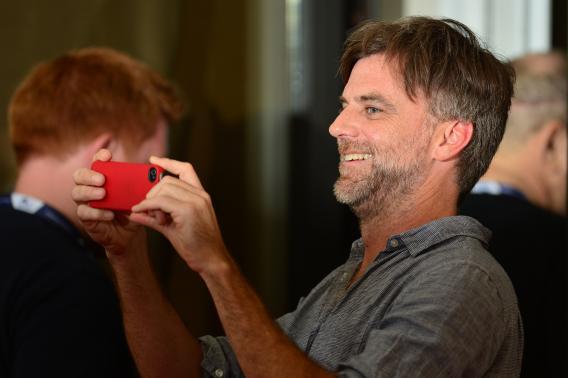For movie lovers, every new Paul Thomas Anderson film is an event. The writer-director has released only six features in over fifteen years, counting The Master, which comes out in limited release tomorrow. His last four movies—Boogie Nights, Magnolia, Punch-Drunk Love, and There Will Be Blood—have each inspired raves and fervent debate, with many calling him the most talented director of his generation.
But for PTA fanatics looking to gear up for The Master, there’s also the director’s earlier and lesser known works, a few of which reveal the sources for his later films. Anderson, a wunderkind from Los Angeles’ San Fernando Valley, famously started making films while still only in high school. While he generally avoids discussing his early years, some of his first short films can be seen on YouTube (which has become a great place to find directors’ early films).
Before or after you see The Master, here are a few of the minor works you shouldn’t miss.
The Dirk Diggler Story (1988)
The Dirk Diggler Story isn’t the first film Anderson ever made, but he’s described it as the first that wasn’t just goofing around. Before Diggler, the teenaged Anderson made parodies and lighthearted genre experiments with his friends. He made a Miami Vice parody called Brock Landers, a porn-spoofing parody of Young Guns called Young Buns, and a Terminator parody called The Legend of Garth.
The name Brock Landers would eventually show up in Boogie Nights, Anderson’s breakout feature largely based on The Dirk Diggler Story, which he made in high school. Diggler tells roughly the same story as Boogie Nights, but does so in the form of a Spinal Tap-style mockumentary, complete with narration from Anderson’s voice-actor father, Ernie Anderson. Joining the Diggler character are his friend and partner Reed Rothchild (played by John C. Reilly in Boogie Nights) and his director Jack Horner (later played by Burt Reynolds). A few classic Boogie Nights scenes are already fully formed. (You can hear Diggler sing “You’ve Got the Touch” around 15:45.)
Anderson says they eventually showed Diggler at a film festival at the University of Southern California, where it drew admiring laughs. The young director was not immune to a teenage boy’s glee in punny porn titles or to snickering at homoeroticism, but Diggler frequently nails a sardonic tone beyond Anderson’s years—and shows surprising maturity in its small sucker-punch of an ending.
Cigarettes & Coffee (1993)
Before Anderson made Boogie Nights, he made his debut feature Hard Eight, based largely on Cigarettes & Coffee. Not to be confused with Jim Jarmusch’s similarly conversational collection of short films, Coffee and Cigarettes, Cigarettes & Coffee consists of snippets of three separate conversations at a diner. Gradually these snippets reveal that all the characters are connected by one fateful $20 bill.
The setup later became the opening of Hard Eight, with Philip Baker Hall reviving his role as the mentor. But in its structure of interconnected lives brushing against each other within one location, the movie has just as much in common with Magnolia. Anderson’s emphatic style, too, is already on display here, complete with a fondness for tracking shots and rapid dolly-ins.
And the writing dazzles, with its evocative monologues and intricate plot twists. That writing is what won over Philip Baker Hall, whom Anderson recruited while working as a production assistant on a TV movie for PBS. Eventually, Anderson, still only 23, got the film into the Sundance Film Festival.
Couch (2003)
Diggler and Coffee are precociously good. Couch is mostly interesting for being terrible. Punch-Drunk Love may have proven wrong those who doubted that Anderson and Adam Sandler could fruitfully collaborate, but Couch suggests the kind of disaster those doubters feared Punch-Drunk would be.
Using exaggerated sound effects and fart noises, Couch tells the story of one man’s quest for comfort in couch shopping. The black-and-white short has a Chaplinesque quality, but even the cruel twist of its ending is mostly spoiled by Sandler’s infamous silly voices—and one last gratuitous fart noise.
Music Videos
Anderson’s few other shorts—including a Saturday Night Live sketch and some throwaway bits from Punch-Drunk Love—seem to be unavailable online, but he has also directed a handful of music videos. And though the inventive filmmaker mostly takes the standard lip-synching-at-the-camera approach, several of the videos are exciting stylistic experiments that later paid off in his films.
His first video, for example, for Michael Penn’s “Try,” is one continuous shot tracking the singer down a long and hectic hallway (there’s a similar sequence in Magnolia). His video for Fiona Apple’s cover of “Across the Universe” employs a similar concept, this time placing the singer in the middle of a literal riot and featuring a breathtaking roll similar to the car crash in Punch-Drunk Love. (Each video also includes a cameo from an Anderson regular: Philip Seymour Hoffman in “Try” and John C. Reilly in “Universe.”) The blue-and-red palette of his videos from 2000 (“Paper Bag,” “Limp”) reached its ultimate expression in Punch-Drunk. He hasn’t released any videos since, but Apple says he directed one for “Hot Knife.” Don’t be surprised if elements of that video eventually show up in his next feature.
